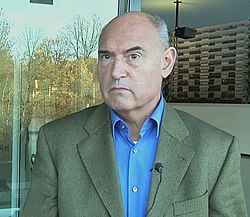Herman Wijffels | |
|---|---|
 Herman Wijffels in 2011 | |
| Chairman of the Social and Economic Council | |
| In office 1 January 1999 –1 April 2006 | |
| Preceded by | Klaas de Vries |
| Succeeded by | Alexander Rinnooy Kan |
| Personal details | |
| Born | Herman H.F. Wijffels 13 March 1942 Turkeye,Netherlands |
| Political party | Christian Democratic Appeal (from 1980) |
| Other political affiliations | Catholic People's Party (until 1980) |
| Spouse | Herma van der Weide (m. 1970) |
| Residence(s) | Maarn, Netherlands |
| Alma mater | Tilburg University (Bachelor of Economics, Master of Economics, Doctor of Philosophy) |
| Occupation | Politician · Civil servant · Economist · Financial adviser · Researcher · Businessman · Banker · Corporate director · Nonprofit director · Trade association executive · Academic administrator · Lobbyist · Author · Professor |
H.H.F. "Herman" Wijffels (born 13 March 1942) is a retired Dutch politician of the Christian Democratic Appeal (CDA) party and businessman.
Contents
From 1981 to 1999 he worked for the Rabobank ultimately as chairman of the board of directors and from 15 March 1999 until 1 April 2006 he was chairman of the Social-Economic Council (Sociaal-Economische Raad, SER). From 2006 to 2008 he was the Dutch representative at the World Bank, succeeding Ad Melkert. For the 2006-2007 Dutch cabinet formation, Wijffels was recommended by informateur Rein Jan Hoekstra to lead the negotiations between the CDA, PvdA and ChristianUnion. On 22 December 2006 Queen Beatrix appointed him as Hoekstra's successor as informateur. He has been referred to as "the best prime minister the Netherlands never had". [1]
He has been involved in supporting many causes since his retirement from the SER as his biography by Jan Smit illustrates. [2] On leaving the SER, he demonstrated his bridging role by bringing together people from his traditional world and alternative world in a leaving event with Prof Ervin Laszlo, Dr Don Beck and Peter Merry. He repeated this with a major event focused on societal transformation in the Netherlands called Klaar om te Wenden [3] (which translates as the sailing term "Ready About!").